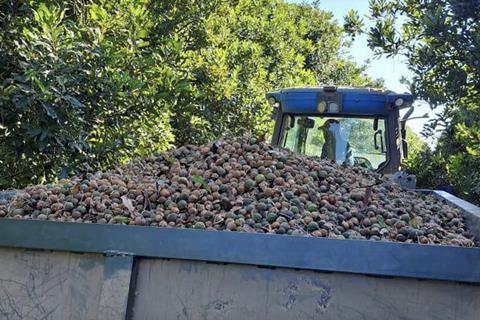TopNut is set to bring fresh genetics to the South African nut industry, with the goal of giving it an edge in global markets
South Africa’s nut export industry is set for a major transformation, with two companies combining to bring forward new genetics that could give it an edge in worldwide markets.

The country primarily produces macadamias and pecan nuts for export, with smaller volumes of walnuts, almonds, cashews, hazelnuts, pistachios and peanuts.
Of this, Macadamia nuts represent 61 per cent and pecans 39 per cent, but expansion of trade is restricted because older varieties still dominate production.
With new varieties based on fresh genetic material it is hoped that the country will take major strides in the years ahead.
To this end, TopNut was founded as a joint venture between TopFruit and Agristar to combine expertise in intellectual property management and tree nut production.
“Its independence from nurseries, grower groups, processors, and marketers allows it to collaborate freely and expand globally without bias,” said Anneli Bosman, general business developer at TopNut.
Macadamia production is expected to exceed 320,000 tonnes (NIS) in 2024/25, doubling over the past decade.
“In 2023/24, South Africa led global macadamia production, contributing 32 per cent (kernel basis), ahead of China and Australia (each 19 per cent),” she noted.
Ideal growing conditions and opposite seasons to the Northern Hemisphere allow South African growers to supply less competitive export windows, Bosman explained.
China receives 90 per cent of pecan exports, timed for Chinese New Year, with South Africa benefiting from proximity and high nut quality.
“Despite its economic value – foreign exchange earnings, job creation, and local value-add – the nut industry lacks domestic visibility,” she continued.
“Size and kernel percentage significantly impact pricing, with differences of up to R20/kg between pecan sizes.”
TopNut’s mission centres on protecting intellectual property and enforcing Plant Breeders’ Rights (PBR).
“It identifies, evaluates, and commercialises top-performing varieties within a secure, managed framework, delivering value to breeders, growers, and the broader supply chain,” Bosman outlined.
“Committed to innovation and sustainability, TopNut supports producers with high-performing varieties, expert advice, and proven commercial strategies.
”Its values-driven model prioritises people, profit, and planet through strong governance and eco-friendly practices,” she pointed out.
Two new varieties could play a significant role in South Africa in future, according to Bosman.
“TopNut is the master license holder in Africa for MCT1, a premium Australian-bred macadamia variety owned by the Macadamia Conservation Trust (MCT) and licensed globally by the Australian Nurserymen’s Fruit Improvement Company (ANFIC).
”It is known for its precocity, bearing commercial yields from year 3-4, consistent high production, and superior kernel recovery.
”Over 1mn trees are established globally, with 40,000 planted across South Africa, Kenya, Malawi, Eswatini, Mozambique, and Zambia,” she said.
TopNut also holds the global testing license for Potamia Erdin, a Turkish walnut variety discovered by Dr Erdin Devrim.
“Known for its thin shells, large fruit, and high seed efficiency, Potamia Erdin is self-fertile, ripens early to mid-season, and thrives in high temperatures,” Bosman added.
”Its large leaves help cool nuts during heatwaves, eliminating the need for up to five kaolin sprays typically used to prevent sunburn and heat stress, making it more sustainable and cost-effective than standard varieties.”



